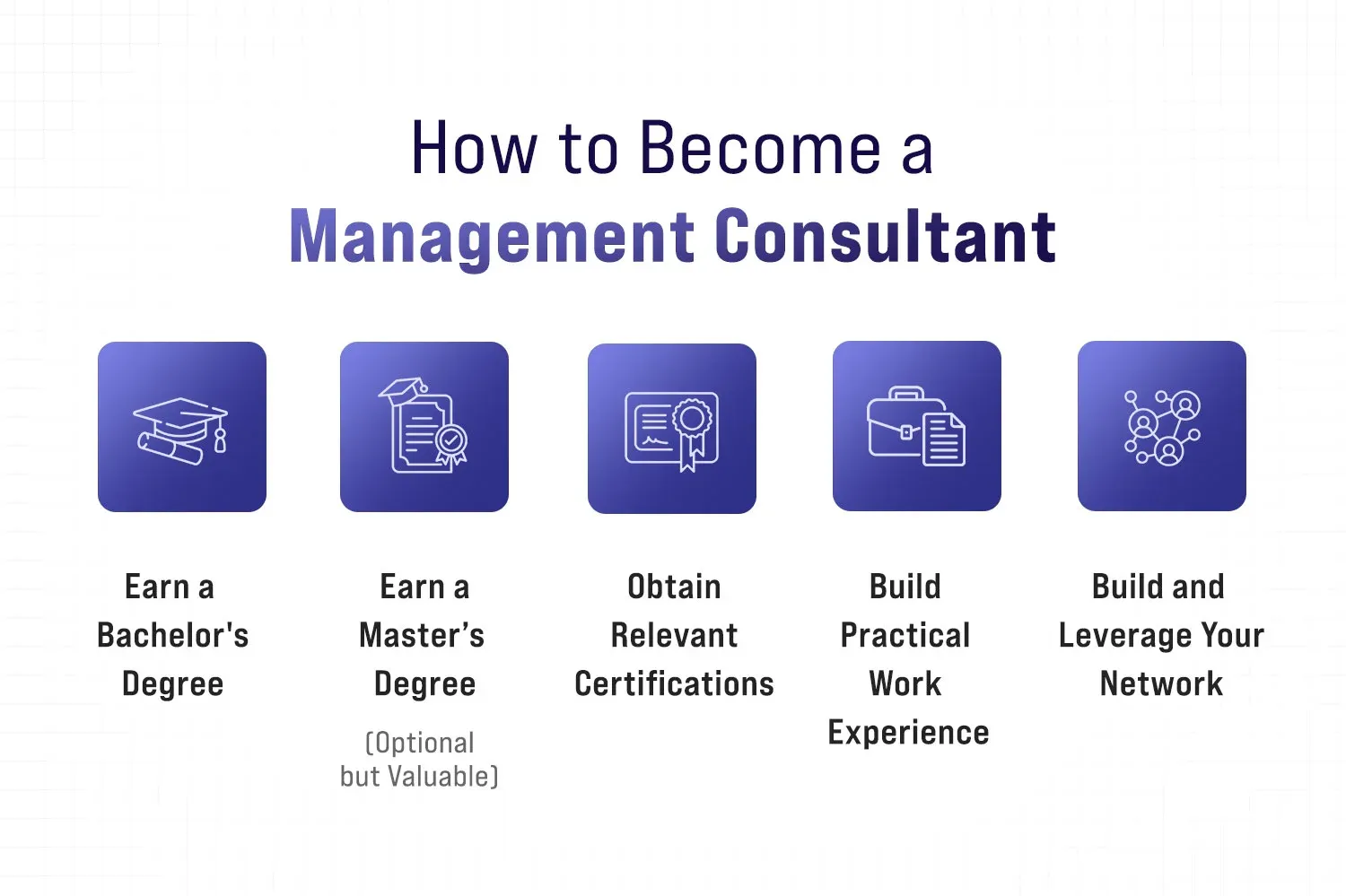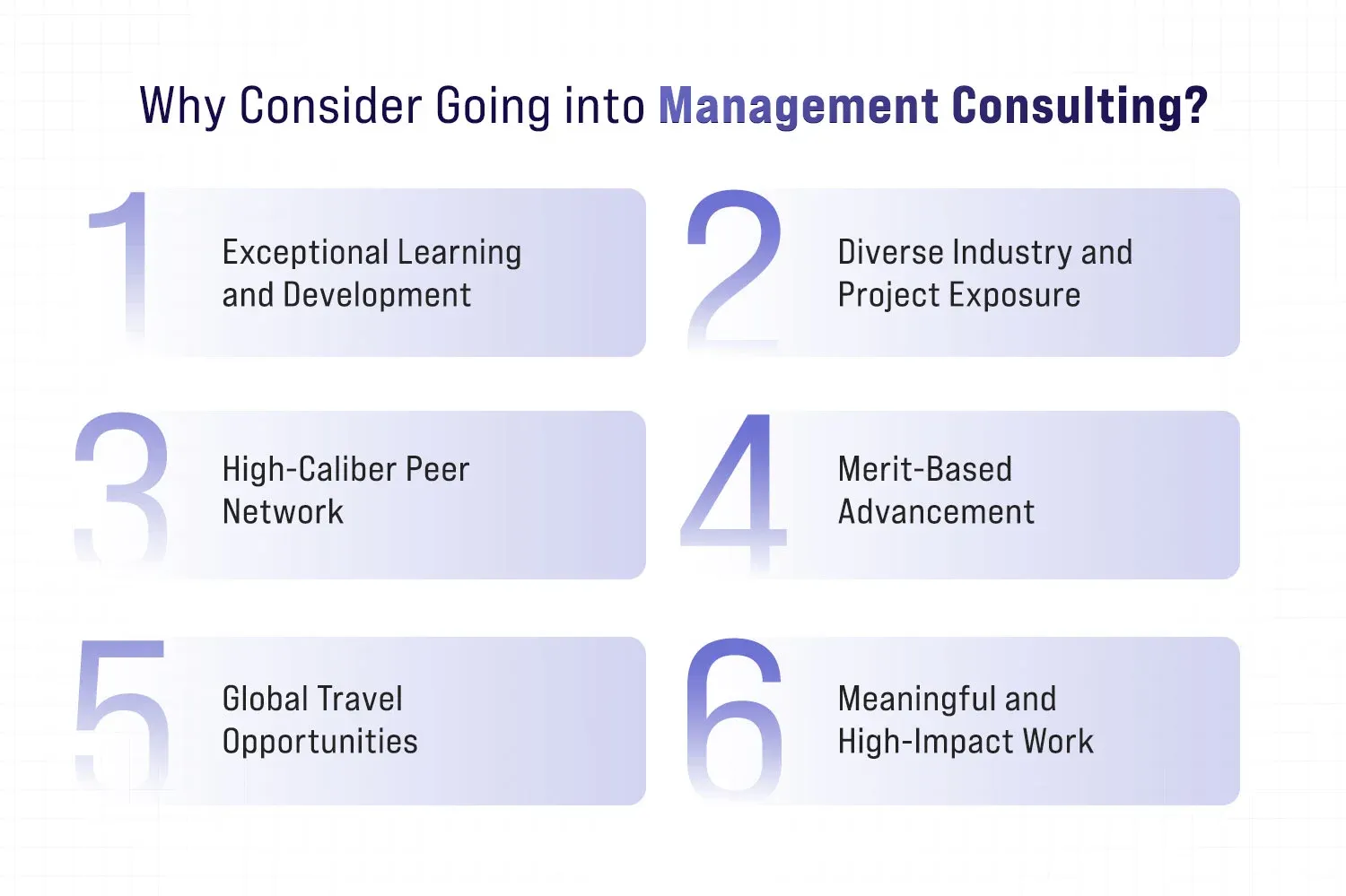How to Become a Management Consultant?

Management consulting has emerged as a highly coveted career path for those passionate about business strategy. Renowned for its dynamic nature, this field presents a distinctive avenue to engage with diverse industries and address intricate organizational hurdles.
Consequently, graduates with backgrounds in business or management often view a management consultant role as an ideal opportunity to leverage their critical thinking, problem-solving, and communication prowess in tangible and meaningful ways.
This guide delves into the essence of management consulting, elucidates the day-to-day activities of consultants, examines the enduring appeal of this profession, and outlines the pathways to embark on a career in this competitive yet fulfilling domain.
What is Management Consulting?
Management consulting delivers specialized advisory services to organizations aiming to enhance operational effectiveness, streamline processes, and achieve sustainable growth through external insights. These services are typically rendered by consultants who either specialize in specific business functions like strategy, operations, marketing, human resources, and IT or offer more generalist services.
Consultants often work with senior executives to analyze business challenges and develop actionable strategies for growth, transformation, or optimization. They might work independently, but more often, they are employed by consulting firms ranging from global giants like McKinsey & Company, Boston Consulting Group (BCG), and Bain & Company (the "Big Three") to niche boutique firms that focus on specific industries or functions.
What do Management Consultants Do?
Management consultants serve as catalysts for organizational improvement, diagnosing challenges, proposing tailored solutions, and facilitating the execution of strategic transformations. At their core, they offer unbiased counsel and specialized knowledge to optimize efficiency, curtail expenditures, boost productivity, and foster enduring growth.
Often hired for specialized knowledge or an independent perspective, their responsibilities include research and data analysis, stakeholder interviews and workshops, and assessments to find inefficiencies or opportunities. They develop actionable strategies and assist with implementation.
Consultants work across business strategy, finance, supply chain, IT, HR, eCommerce, and marketing. They may be employed by large, full-service consultancy firms offering end-to-end business solutions or by smaller, niche firms with expertise in specific functions or sectors.
In practical terms, a management consultant’s role may involve:
- Pinpointing organizational challenges through meticulous research, in-depth interviews, and interactive workshops.
- Analyzing intricate data sets to discern emerging trends, operational inefficiencies, or potential risks.
- Developing and rigorously testing hypotheses to underpin informed recommendations.
- Crafting and presenting comprehensive reports and compelling business proposals.
- Spearheading the implementation of novel systems or refined operational procedures.
- Working in partnership with client teams to facilitate smooth transitions and implement structured change initiatives for long-term success.
- Evaluating the impact of implemented projects and adapting strategies as necessary.
As consultants gain experience, they often take on leadership roles, managing junior team members, overseeing projects, and contributing to business development through proposals and client relationship management.
How to Become a Management Consultant
Here is how to become a management consultant after 12th which requires a mix of strong education, practical experience, and strategic networking.

Earn a Bachelor's Degree
The first essential step toward becoming a management consultant is earning a bachelor's degree. While companies accept candidates from a wide variety of academic backgrounds, degrees in business, economics, finance, engineering, or social sciences are particularly valued. These fields develop strong analytical, quantitative, and problem-solving skills that are crucial for consulting work.
High academic achievement matters: top consulting firms, especially the MBB (McKinsey, BCG, Bain), often look for candidates who graduated with honors or achieved a high GPA. Participating in case competitions, leadership activities, and internships during your undergraduate years can also help you stand out early.
Earn a Master’s Degree (Optional but Valuable)
While not mandatory, a master’s degree, particularly an MBA from a top program, can greatly enhance your prospects. Prestigious consulting firms often recruit directly from leading MBA programs around the world.
An MBA or specialized master's program helps you refine essential skills such as strategic thinking, financial modeling, operations management, and leadership. It also provides opportunities to network with industry professionals, participate in consulting clubs, and secure consulting internships, which often convert into full-time offers.
Obtain Relevant Certifications
If you don't want to go for an MBA degree, you can choose to obtain certifications from a recognized institution instead. It can add credibility to your profile and distinguish you from other candidates. Some valuable certifications include:
- Certified Management Consultant (CMC): Offered by institutes like the Institute of Management Consultants (IMC).
- Project Management Professional (PMP): Useful for consultants working on operational or project-based roles.
- Lean Six Sigma Certifications: Helpful for consultants focused on operations improvement or process optimization.
- Business Analytics or Data Science Certifications: Increasingly important for management consultants working with data-driven strategy.
Earning industry-recognized certifications demonstrates expertise and a dedication to continuous learning, enhancing employability and positioning you for career progression.
Build Practical Work Experience
Gain hands-on exposure through internships or full-time roles, building a record of professional achievements and laying the groundwork for your consulting career. Firms are looking for candidates who demonstrate:
- Problem-solving and analytical skills.
- Leadership and teamwork abilities.
- Project management experience.
- Client-facing or stakeholder management exposure.
Even roles outside consulting, if positioned correctly, can highlight transferable skills relevant to consulting work.
Build and Leverage Your Network
Finally, building a strong professional network can make a pivotal difference. Management consulting is highly competitive, and referrals from trusted contacts within firms often carry significant weight during recruitment. To build a robust professional network, consider the following strategies:
- Attend university consulting clubs and career fairs.
- Connect with current or former consultants via LinkedIn.
- Participate in case competitions judged by consulting firms.
- Request informational interviews to learn about consultants’ career journeys.
- Join professional organizations or online communities related to consulting.
A strong network can open doors to interviews, insider tips, and referral opportunities at top consulting firms.
How Long Does It Take to Become a Management Consultant?
The journey to becoming a management consultant generally spans 4–7 years, influenced by academic background, skill development, and career trajectory.
- Bachelor’s Degree: Most candidates start by completing a 3-year undergraduate degree in business, economics, engineering, or a related field.
- Optional Master’s Degree: Many consultants pursue an additional 1–2 years of postgraduate education to strengthen their qualifications and access top consulting firms.
- Work Experience: Some candidates gain 1–3 years of relevant work experience before moving into consulting, although top firms also recruit fresh graduates and MBA students directly.
If you enter consulting straight after your undergraduate degree, it can take about 4 years. If you pursue a master’s degree or build experience first, it can extend to around 6–7 years.
How to Become a Management Consultant in India?
Launching a career in this field demands a methodical plan to acquire relevant experience, develop key competencies, and secure impactful roles. Here are three important steps to help you get started:
- Apply for Internships: Internships are one of the best ways to break into the consulting industry. Top firms often hire full-time consultants from their intern pools. Look for internship opportunities during your undergraduate or graduate studies and focus on firms that offer real client exposure and mentorship.
- Build Your Resume: Consulting firms look for candidates with strong problem-solving skills, leadership experience, and a track record of high achievement. Highlight internships, academic excellence, extracurricular leadership, case competition wins, and relevant skills such as data analysis, strategic thinking, and communication.
- Search for Vacancies: Once you have gained relevant experience and built a strong resume, actively search for full-time consulting roles. Monitor company career pages, LinkedIn, and university recruiting platforms. Tailor each application to the firm and prepare thoroughly for case interviews to maximize your chances of success.
Why Consider Going into Management Consulting?
Here are six key reasons why going into management consulting can be a rewarding opportunity.

Exceptional Learning and Development
Management consulting firms are deeply invested in your professional growth because you are the product they offer to clients. This creates an environment where constant learning is not only encouraged but expected. You gain exposure to structured training programs, mentorship from experienced consultants, and hands-on learning from diverse and high-impact projects. This makes consulting an ideal launching pad for long-term success.
Diverse Industry and Project Exposure
In consulting, you work on projects that span different industries, functions, and geographies. One month you might be helping a retail giant improve its supply chain, and the next you're advising a tech startup on its growth strategy. This variety allows you to ‘test-drive’ multiple roles and sectors, helping you discover where your true interests lie. It also builds a strong, well-rounded skill set that’s applicable in nearly any future role, making you highly adaptable and versatile in your career.
High-Caliber Peer Network
Management consulting attracts some of the most talented, intelligent, and motivated professionals. The collaborative environment means you're constantly learning from peers who challenge you to grow. Being surrounded by such high performers also raises your own standards and performance. You build a powerful, supportive network of like-minded individuals who can become mentors, collaborators, or even future business partners.
Merit-Based Advancement
Consulting is known for its meritocratic culture. Your reputation is built project by project, and since you work with different teams frequently, your performance speaks for itself. Unlike more hierarchical or politics-heavy industries, advancement in consulting is closely tied to your skills, contributions, and results. This transparency and fairness can be very motivating for individuals who thrive on earning their progress.
Global Travel Opportunities
Management consulting often involves working with clients in different cities or countries. This opportunity allows professionals to immerse themselves in diverse cultures, dynamic workspaces, and innovative mindsets, enriching their global outlook and adaptability. Moreover, the firm often covers travel expenses, making these opportunities financially accessible as well.
Meaningful and High-Impact Work
Consultants are brought in to solve a company’s most critical and complex challenges. Whether it’s guiding a turnaround strategy or helping a firm enter a new market, the work is high-stakes and impactful. Many consultants report a strong sense of purpose, knowing their insights and recommendations help shape the direction of major businesses. If you're someone who wants to make a real difference and solve big problems, consulting provides a direct avenue for that kind of fulfillment.
Summing Up
Management consulting presents a dynamic and fulfilling career for those eager to tackle intricate business problems and deliver transformative solutions. While the journey to becoming a consultant requires a solid educational foundation, strategic career moves, and consistent networking, the investment pays off through accelerated professional growth, diverse project experience, and exposure to top-tier business environments.
By developing critical skills, earning relevant credentials, and building a strong professional network, you can position yourself for success in management consulting and unlock a career filled with continuous learning, global opportunities, and impactful work.

